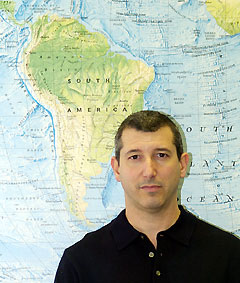|
This is an archived article.
For the latest news, go to the
Advance Homepage
For more archives, go to the Advance Archive/Search Page. | ||
|
Latin American Studies Center Research on the countries and people that constitute Latin America is a booming business in Storrs. And the United States had better start paying more attention to this vital region too, says Peter Kingstone, director of the Center for Latin American and Caribbean Studies and an associate professor of political science.
"Neither the business world nor the government has a good understanding of what it's like on the ground in Latin America," says Kingstone. "People think that if an idea works here, it's going to work there. They forget that in much of Latin America they're dealing with extreme poverty, with a poor educational system, with very different cultures. We have to be a lot more flexible in our policies, in our business contacts, if we're to help them develop their economies." UConn, with at least 25-30 "core people," including faculty and staff, and another 25-30 people whose work touches on the region, is poised to be a leader in the field, he says. "There is a lot of dynamism regarding Latin America on this campus," he says, pointing to current faculty, recent faculty hires, and an increase in student interest, especially during the past year. Kingstone says he also inherited an excellent program. The foundation was laid by Hugh Hamill, emeritus professor of history, and Jo Barstow, who started the program in the 1970s, and by Kingstone's predecessor, Elizabeth Mahan (now associate director of international affairs). Kingstone, who took over the reins of the center last year, intends to continue building it. Already, he has organized two major conferences, including a November 8 event regarding the future of democracy in Colombia. He also has begun upgrading the center's website, building what he hopes will become a site "that will make people think of this as the place to come" for information about Latin America, one that is rich with links to information inside and outside the University. Kingstone also is redesigning the center's long-time newsletter, Ariel, and hoping to expand its distribution to government and business leaders interested in Latin America. Moving the center forward also means building stronger ties among the array of Latin American specialists at UConn, bringing graduate and undergraduate students together on a more regular basis, and involving others outside the community. On that front, Kingstone is working with his counterparts at Florida International University and officials with Wirthlin Worldwide, to win grant money for an annual survey of Latin America's people, focusing on their opinions regarding economic reform, democracy, and other key areas. The results would be shared with researchers who would study the data and use it to help leaders of Latin American countries shape public and economic policies and work toward democratic governance. Kingstone earned his master's and doctorate degrees at the University of California at Berkeley, focusing on the politics of neo-liberalism in Brazil, an attempt to reform the country's economic and business practices. He came to UConn in 1999, after a five-year term as an assistant professor at the University of Vermont. |

